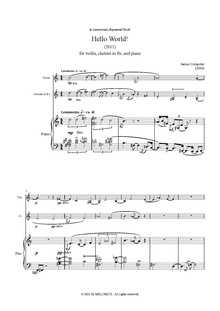Hello World! (composition)

Hello World! is a piece of contemporary classical music for clarinet-violin-piano trio composed by Iamus Computer in September 2011. It is arguably the first full-scale work entirely composed by a computer without any human intervention and automatically written in a fully-fledged score using conventional musical notation.[1][2][3] Iamus generates music scores in PDF and the MusicXML format that can be imported in professional editors such as Sibelius and Finale.
Title
The title makes reference to the computer program Hello World, which is traditionally used to teach the most essential aspects in a programming language.
Dedication
The composition is dedicated to the memory of Raymond Scott, an electronic music pioneer and inventor of the Electronium.
Premiere
Hello World! was given its premiere performance on October 15, 2011 by Trio Energio[4] at the Keroxen[5] music festival in Santa Cruz de Tenerife, Spain. The performers were Cristo Barrios (clarinet), Cecilia Bercovich (violin), and Gustavo Díaz-Jerez (piano).
Critics
As supported by neuroscientific studies,[6][7] critiques to Hello World! are suitable to be affected by anti-computer prejudice, derived from the fact of knowing in advance (or not) the non-human nature of the author. The following are two examples of critiques where the critic (Service) is aware that the composer is Iamus, and when he is not informed of who made the piece (Russell).
- Tom Service, music critic for The Guardian, in reviewing a performance of Hello World! by human musicians, noted that the piece "...sounds like it's slavishly manipulating pitch cells to generate melodies that have a kind of superficial coherence and relationship to one another, with all the dryness and greyness that suggests, despite the expressive commitment of the three performers."[8]
- Peter Russell, musicologist, was asked to review Hello World! for the BBC, based on a video of the life premiere, but he was not given any information about the composer. In his critique, Russell writes "on listening to this delightful piece of chamber music I could not bring myself to say that it would probably be more satisfying to read the score than listen to it. In fact after repeated hearings, I came to like it".[9][10]
See also
- Algorithmic composition
- Computer Music
- Iamus computer
Notes
- ↑ http://www.eldia.es/2011-10-14/CULTURA/6-Keroxen-auna-coreografia-musica-escenario-Tanque.htm
- ↑ Dude Ellingtone (2011-10-14). "Keroxen ofrece este fin de semana una intensa programación de música y danza". Creativacanaria.com. Retrieved 2014-01-01.
- ↑ "indicesiete.com". indicesiete.com. Retrieved 2014-01-01.
- ↑
- ↑ http://www.amigosdeltanque.com/keroxen-2011
- ↑ Ball, Philip (2012). "Algorithmic Rapture". Nature 188: 456. doi:10.1038/488458a.
- ↑ Nikolaus Steinbeis1 and Stefan Koelsch2 (2008-07-04). "Understanding the Intentions Behind Man-Made Products Elicits Neural Activity in Areas Dedicated to Mental State Attribution". Cercor.oxfordjournals.org. Retrieved 2014-01-01.
- ↑ Service, Tom (1 July 2012). "Iamus's Hello World! – review". The Guardian. Retrieved 2 July 2012.
- ↑ Smith, Sylvia (3 January 2013). "Iamus: Is this the 21st century's answer to Mozart?". BBC News Technology.
- ↑ Ball, Philip (8 August 2014). "Artificial music: The computers that create melodies". BBC Future.